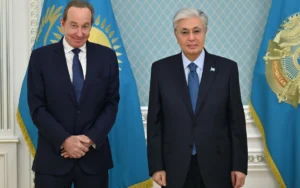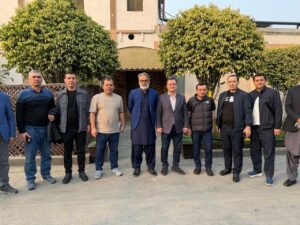Bulgaria’s Zhelyazkov Unveils Record-Fast Governance Program with Bold Reforms Across Key Sectors

Sofia, The Gulf Observer: Bulgarian Prime Minister Rosen Zhelyazkov, accompanied by his three deputy prime ministers, presented a detailed progress report on the government’s policy implementation, emphasizing that the current governance program was adopted in just 38 days—making it the fastest in the country’s democratic history.
“The program, adopted on February 24, is tailored for a full four-year mandate and outlines 100 priorities, 257 objectives, and 710 measurable actions,” Zhelyazkov stated. “Its central goals are to elevate the quality of life, reinforce judicial transparency, secure eurozone accession, and promote sustainable economic development.”
Fiscal Discipline and Anti-Corruption
The Prime Minister highlighted that the national budget was swiftly passed to ensure the deficit remains under 3%, a key eurozone criterion. Tax revenue collection increased by BGN 1.1 billion, with a projected BGN 1 billion more expected through enhanced fiscal oversight. Measures to combat corruption include integrity testing in the Ministry of Interior and over 2,000 enforcement operations. Additionally, 34 surveillance drones and 300 unmarked vehicles have been deployed to bolster border and internal security.
Defense and Digital Modernization
Deputy Prime Minister Tomislav Donchev announced mid-year tenders for local drone production for the Ministry of Defense. The government is also investing in digital transformation—creating cybersecurity councils and implementing internal digital documentation systems. AI and STEM development is prioritized through the setup of AI labs in 100 schools, along with ongoing exploration of Black Sea oil and gas resources.
Education, Energy, and EU Funds Recovery
Donchev criticized the previous administration for a sluggish implementation of the Recovery and Resilience Plan, noting that only 8% of allocated funds were utilized. Since January, BGN 700 million has been disbursed, reversing the trend. Meanwhile, households are exempted from entering the free electricity market to ease energy transition burdens.
Welfare, Infrastructure, and Public Services
Deputy PM Atanas Zafirov announced an 8.6% pension hike effective July 1. An additional BGN 150 million has been allocated to extend social programs like “Hot Lunch” and “Home Care.” More than 100,000 individuals have received digital training vouchers. Infrastructure projects include the near-completion of the Botevgrad–Mezdra road and the launch of municipal investment programs.
Transport, Economy, and Healthcare
Deputy PM Grozdan Karadjov reported on expanded digital infrastructure, procurement of 60 zero-emission trains, and new legislation on public transportation. Accidents on roads and railways are down 23% and 40%, respectively. In healthcare, the construction of the National Children’s Hospital is accelerating. Two medical helicopters have been delivered, with 50 hospitals set to receive upgraded diagnostics. Psychiatric care wages have risen by 50%, and 170 specialists are undergoing state-sponsored training.
Culture and Strategic Investment
A new Film Industry Act has been finalized, and a National Cultural Calendar will launch in 2026. The government is also forming a registry of professional artists and working to modernize performing arts funding.
PM Zhelyazkov concluded by reaffirming Bulgaria’s commitment to attracting major international investors and positioning the country as a hub for strategic industries.
“We’re building a stable and predictable environment for anchor investments that can transform entire sectors and regions,” he said, underlining the administration’s focus on regulatory and infrastructure readiness for projects like Balkan Stream.


